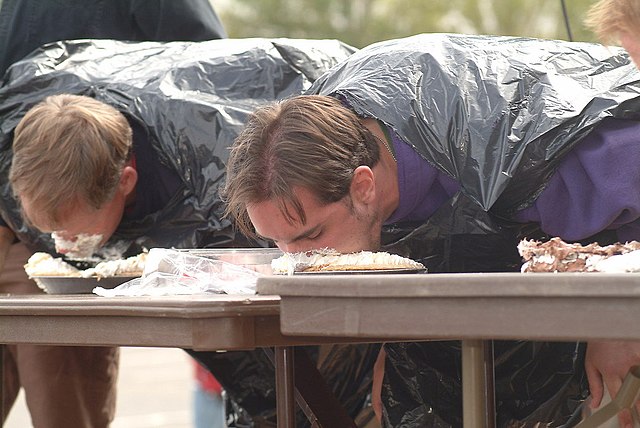Slapping contests where combatants smack each other across the face until a knockout. Pie Eating Contests, in which gluttonous competitive eaters gulp down as many pies as humanly possible. Cheese Rolling, where participants race to chase down a large wheel of cheese and Toe Wrestling, that requires its contestants to interlock their toes with the goal of pinning their foot to the ground are sports that were created in order to attract participants and create passionate fans through their respective oddities.
From cheese rolling down steep hills to slapping contests that leave competitors dazed, the world is home to such bizarre sports that push the limits of competition in unexpected and unconventional ways.
Most people would argue that unconventional sports do not deserve a place in high school sports programs since it lacks the educational aspect and developmental benefits which are associated with the other established sports. These sports also might seem unusual to students who are familiar with traditional, mainstream sports like basketball and soccer.
“Their recognition as legitimate sports depends on how broadly one defines the term,” sophomore former football player Kirtan Beduya shared. “Some might argue that the entertainment value and unique skill sets involved warrant recognition, while others might maintain a stricter definition focusing on physical exertion and athleticism.”
Slapping contests, also called slap boxing, are considered the most normal — though often the most violent., This extreme sport involves two participants taking turns delivering powerful slaps, with the goal of stunning or even knocking out their opponent.
This sport, in its early years, was not officially recognized. It was by the organization of slapping contests in underground settings in Russia that it was able to gain popularity in the early 2010s through the viral nature of social media and eventually became a form of entertainment that spread internationally.
Pie Eating Contests test a competitor’s ability to consume an enormous amount of pie over a short period of time. The objective is simple; finish the pie faster than the other contestants. The origins of this sport can be traced back to 1870 where a pie contest took place in Toronto as a fundraiser. From then on, the sport was able to get mainstream popularity in North America.
Cheese Rolling, however, comes with a rich history. Believed to have originated in England as early as 1826, this event challenges participants to race down a dangerously steep hill in pursuit of a large rolling wheel of cheese. The first to reach the bottom wins and takes the cheese home as a prize.
Another weird sport was created in 1974 by drinkers frustrated by the World Cup. Those who wanted the British to win against East Germany, invented toe wrestling. Similar to arm wrestling, competitors sit face-to-face and lock their toes together with the goal of winning by forcing their opponent’s foot to the ground.
Although these unusual sports entertain participants and attract audiences, they remain unconventional, and their legitimacy as true athletic competitions is often debated.
Mainstream sports such as basketball, American football and soccer gain legitimacy through cultural acceptance and growing popularity, further solidifying their place in society.
The question remains: Should these contests be even considered real sports?
High school sports provide benefits that go beyond physical fitness, like developing communication skills, teaching teamwork, achieving goals and being disciplined.
“I do not believe these sports deserve a high school sports program because it would not be taken seriously by other students,” sophomore wrestler Elizabeth Chavez shared. “To be honest, whoever joins those programs will most likely get bullied.”
However a minority supports including these sports into high school programs.
“Although they are weird, I do not see any danger in including these sports,” sophomore Bryan Carillo shared. “My only concern is that there should be safety and sanitary regulations as some of the sports require contact while others are peculiar, such as toe wrestling.”
As of now, it is unlikely that many students would want to participate in these sports or fight for them to be included in high school programs.
“Weird sports take attention away from traditional sports because they bring in crowds that undervalue the hard work and dedication traditional athletes put in to perfect their craft,” Chavez explained.




